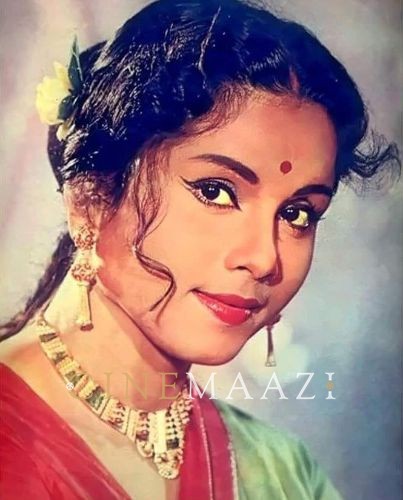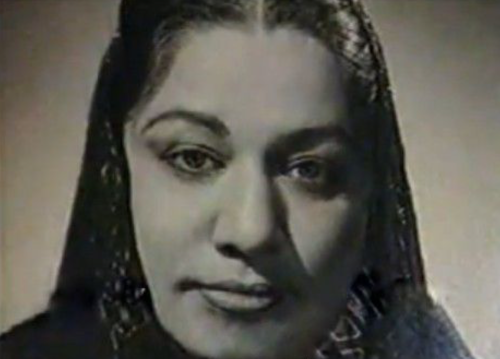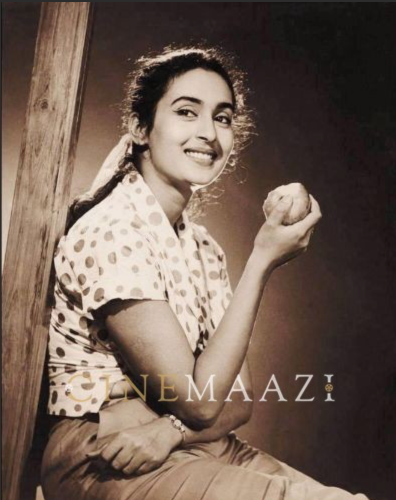"Koi Door Se Awaz De Chale Aao" - Abrar Alvi
23 Mar, 2020 | Beete Hue Din by Shishir Krishna Sharma
Whenever Guru Dutt’s name is discussed, another name automatically comes to mind and that name is of writer-director Abrar Alvi who was not only his close friend and preferred story-screenplay-dialogue writer, but he had also directed ‘Guru Dutt Films’ hit Film Sahib Bibi Aur Ghulam. I met Abrar Alvi at his Andheri (West)’s Millat Nagar Flat. During our meeting he talked in detail about his personal and working life.
Whenever Guru Dutt’s name is discussed, another name automatically comes to mind and that name is of writer-director Abrar Alvi
His father was originally from Ayodhya-Faizabad and he was the Police Prosecutor in Yavatmal area of Central Provinces and had retired from the post of D.I.G. Abrar Alvi was born on 1st July 1927 in Ayodhya. Due to his father’s career, he spent a majority of his childhood in cities like Hoshangabad, Akola, Nagpur, Jabalpur and Khamgaon.Abrar Alvi told me, “I did a major part of my education in Nagpur where I also used to work as an amateur writer and actor on radio. During my college days I wrote many plays as well. I completed M.A., L.LB. and in the year 1951 came to Mumbai to pursue my dream of becoming an actor. Famous playwright Habib Tanvir was my senior during college. On his suggestion, in Mumbai, I joined IPTA. I spent nearly four months in Mumbai without any fixed place of stay. Then one day I happened to meet Irshad Hussain who was my paternal cousin. I did not know that he was also in Mumbai and was working in films.”

Irshad Hussain had changed his name to Jaswant and was playing an important role in Guru Dutt’s upcoming directorial Baaz. He took Abrar Alvi to his house and thus Abrar Alvi got a roof over his head for the first time in Mumbai.
Irshad Hussain had changed his name to Jaswant and was playing an important role in Guru Dutt’s upcoming directorial Baaz. He took Abrar Alvi to his house and thus Abrar Alvi got a roof over his head for the first time in Mumbai. Film Baaz was released in 1953. It’s hero-heroine were Guru Dutt and Geeta Bali and the composer was O. P. Nayyar. This movie was produced by Geeta Bali’s elder sister Haridarshan Kaur. During the shooting of Baaz, Haridarshan Kaur and Jaswant fell in love and got married soon after.(Geeta Bali’s real name was Harkirtan kaur. Her sister Haridarshan Kaur and Jaswant’s daughter Yogeeta Bali was a star actress during the 1970s. She is married to famous actor Mithun Chakraborty now. Haridarshan Kaur and Jaswant’s son and Yogeeta’s brother Yogesh’s wife Hemlata is a famous playback singer of Hindi Cinema.)
Abrar Alvi recalled to me, “I loved driving and therefore as a driver I started going to the shooting of Baaz as a driver with Jaswant. I soon became good friends with the film’s assistant director Raj Khosla."
Abrar Alvi recalled to me, “I loved driving and therefore as a driver I started going to the shooting of Baaz as a driver with Jaswant. I soon became good friends with the film’s assistant director Raj Khosla. One day during a lunch break conversation, I told him that the dialogues of the movie should be according to the character. Guru Dutt heard me say this. He inquired about me with Raj Khosla and after coming to know my background gave me the responsibility of writing the dialogues of his next movie Aar Paar. This movie which released in 1954 was very successful and after that I got associated with Guru Dutt permanently.” 
During his college days Abrar Alvi had written a comic play called Modern Marriage which had been quite successful. Guru Dutt read it and liked it so much that he made a film Mr and Mrs 55 on it.
During his college days Abrar Alvi had written a comic play called Modern Marriage which had been quite successful. Guru Dutt read it and liked it so much that he made a film Mr and Mrs 55 on it. This film was also very successful but he was credited only for its dialogues. The film’s credits did not include the names of the story writer and screen play writer at all. Abrar Alvi told me, “The son of a Hyderabad based landlord who were Reddys studied with me in Nagpur. Through him I met a prostitute who was the daughter of a Gujrati temple priest. She had run away with her lover from her home and finally, after being cheated by him became a prostitute. I was quite impressed by the girl’s way of speaking and values. I wrote the character of Guru Dutt’s film ‘Pyaasa’s Gulaabo keeping her in mind.”

It is often said that whatever recognition Abrar Alvi got was due to Guru Dutt but this statement pinched Abrar Alvi a lot. He said that no one bothered to see and understand the other side of the story.
It is often said that whatever recognition Abrar Alvi got was due to Guru Dutt but this statement pinched Abrar Alvi a lot. He said that no one bothered to see and understand the other side of the story. According to him, like the movie Mr and Mrs 55, for Pyaasa also he was credited only as the dialogue writer but despite the fact that he had made an equal contribution to the movie’s story and etching out its characters. Abrar Alvi told me a lot of interesting things about the movie Pyaasa. He told me :- “I always used to be on the film’s set and monitor the artists’ language and pronunciation. However due to some reasons, I was not able to attend the film’s shooting for a few days. Actors Radhe Shyam and Mehmood were playing the roles of elder brothers of the hero Guru Dutt. On the first day of the movie’s shoot Mehmood had requested to be permitted to speak his dialogues in a Bengali accent which was agreed to. If I had been on the sets at that time I would have never let that happen because in Pyaasa, this was the one family of Benares where all members spoke Bhojpuri mixed Hindi and where the youngest brother Guru Dutt was a poet of Hindi and Urdu. In such a family it looks odd that only one member speaks in a Bengali accent but unfortunately an ace director like Guru Dutt did not pay attention to this anomaly. My aim of saying all this is to remind people of those contributions of mine to Guru Dutt’s creations which have been ignored by everyone till date.”

Abrar Alvi got the credit as a screenplay writer along with that of a dialogue writer for the first time for the movie Kaagaz Ke Phool but it flopped miserably. After its failure, the next script which Guru Dutt had planned to make a film on was titled Pehli Jhalak. Actually, the script had been written by actress-singer Noorjehan’s producer-director husband Shaukat Hussain Rizvi to be made into a film but post-partition he had to leave for Pakistan. The script had been lying with Guru Dutt since. According to Abrar Alvi, his only contribution was limited to giving the movie the new name of Chaudhvin Ka Chaand. After the failure of Kaagaz Ke Phool, Guru Dutt had stopped direction and had given the responsibility of directing Chaudhvin Ka Chaand to famous director M Sadiq. This film proved to be quite successful.

Abrar Alvi had told me, “Guru Dutt Films’ next movie Sahib Bibi Aur Ghulam was planned on Bimal Mitra’s Bengali novel with the same name. I wrote the movie’s screen play and dialogues. Guru Dutt was considering taking up directing with this film once again. I was busy with some movies outside this banner and it was difficult for me to be available for the movie’s shooting. Due to this, the script of the movie was recorded in my voice on a spool running to nearly four hours so that it could become easy for Guru Dutt to understand the story and its characters. However due to personal troubles and heavy mental tension, he decided to not take up direction. He contacted many famous directors like Satyen Bose and Nitin Bose to direct it. When he didn’t get a positive reply from them, He gave me the responsibility of directing the movie.”
Abrar Alvi was reluctant to take up this new assignment. Seeing his reluctance, Guru Dutt instructed him to simply translate on screen what he had done in the recording. Abrar Alvi tried to do that and the movie ‘Sahib Bibi Aur Ghulam’ released in 1962 to wide acclaim.
Abrar Alvi was reluctant to take up this new assignment. Seeing his reluctance, Guru Dutt instructed him to simply translate on screen what he had done in the recording. Abrar Alvi tried to do that and the movie Sahib Bibi Aur Ghulam released in 1962 to wide acclaim. This film not only won the President’s Silver Medal from Dr Radhakrishnan but also got the Filmfare Award for Best Film. In addition, Abrar Alvi got the Best Director Filmfare and Meena Kumari, the Best Actress Filmfare for the movie. After Sahib Bibi Aur Ghulam, Guru Dutt Films decided to remake Kolkata’s New Theatres’ hit movie President. According to Abrar Alvi, due to his being busy, the script of this film was written by Ismat Chugtai and was titled Baharen Phir Bhi Aayengi. On her suggestion, Ismat’s husband Shahid Latif was made its director but the film’s shooting got stopped after the recording of three reels.

I had to complete the movie Bahaaren Phir Bhi Aayengi. Since Guru Dutt was also the hero of this movie, I reshot all his scenes with Dharmendra.
Abrar Alvi recalled, “Guru Dutt called movie President’s writer Benoy Chatterjee from Kolkata to make necessary changes to the script and decided to direct the film himself. Meanwhile, through K Asif, Shahid Latif got pressure applied on Guru Dutt. Guru Dutt told him that he would himself direct the film but Latif was welcome to come and sit on the sets and get the payment as per the contract. Shahid Latif agreed to this but suddenly Guru Dutt passed away. The movie’s 12-13 reels had already been made by then. Considering the situation of the movie’s distributor B M Shah and Guru Dutt’s brother Atma Ram, I had to complete the movie Bahaaren Phir Bhi Aayengi. Since Guru Dutt was also the hero of this movie, I reshot all his scenes with Dharmendra. For doing this I had to leave the writing assignments of lyricist Shailendra’s production Teesri Kasam and director Lekh Tandon’s Jhuk Gaya Aasmaan. However as per the contract, the dummy director Shahid Latif got the credit for the director of Bahaaren Phir Bhi Aayengi. 
Abrar Alvi’s closest friend in the film industry was Sahir Ludhianvi. Abrar met him for the first time in 1951 at Mumbai’s Progressive Writers Association Office where Abrar had gone to meet Habib Tanvir.
Abrar Alvi’s closest friend in the film industry was Sahir Ludhianvi. Abrar met him for the first time in 1951 at Mumbai’s Progressive Writers Association Office where Abrar had gone to meet Habib Tanvir. This meeting soon turned into deep friendship. Remembering Sahir, Abrar said, “Sahir was very straight forward and curt. He used to say very undiplomatically of his fellow composers that they used to listen to English records and prepare the tunes of their Hindi songs after lifting them while the lyricists wrote with their hearts and minds. Hence, the status of lyricists is above that of the composers. He used to ask the producers to pay him one rupee more salary than the composers and this had made many of the top composers of the era against him. Once he went to S D Burman’s house in an inebriated condition and talked to him in such a manner that Burman sworn never to work with Sahir again in his lifetime.”During those days, Pyaasa was being made and its last song was yet to be written and recorded. Guru Dutt and Abrar Alvi tried to convince Burman da for it. After lot of efforts, Burman da relented to agree to recording the song if they could bring the written song from him. He however refused to participate in any sitting whatsoever with Sahir.

After three days of scratching my mind, I finally wrote this dialogue for actor Rehman, “Agar Aaj Vijay Zinda Hote To Hum Unhen Apne Dilon Ke Takht Par Bithaate, Shohrat Ke Taaj Pehnaate aur Gareebi Ki Galiyon Se Utha Kar Mehlon Mein Raaj Karaate!”
Abrar recalled, “The climax of this film was yet to be written when I had to be admitted to the hospital for an operation. I explained the situation of the movie to Sahir and asked him to write the song while I would write the climax after returning from the hospital. When I got discharged from the hospital after three weeks, I came to know that the song had already been recorded. The lyrics of the song were, Yeh Takhton, Yeh Taajon, Yeh Mehlon Ki Duniya, hearing which I was quite troubled. It had been ten years since India had got independent and kingdoms no longer existed. The days of Takhts, Taajs and Mahals were long gone. I was finding it difficult to come up with suitable dialogues for such a senseless song. I asked Sahir what stopped him from coming to the hospital and making me read the song but he silently stood smiling there. What could he tell me anyway? After three days of scratching my mind, I finally wrote this dialogue for actor Rehman, “Agar Aaj Vijay Zinda Hote To Hum Unhen Apne Dilon Ke Takht Par Bithaate, Shohrat Ke Taaj Pehnaate aur Gareebi Ki Galiyon Se Utha Kar Mehlon Mein Raaj Karaate!” Outside Guru Dutt Films Abrar Alvi wrote nearly 20 films including Saathi (1968), Suraj (1966), Prince (1969), Professor (1962), Chhoti Si Mulakaat (1967), Bairaag (1976), Laila Majnu (1973), Do Phool (1973), Sabse Bada Rupaiya (1976), Manoranjan 91974), Sangharsh, Biwi O Biwi (1981) and Janam Janam (1988) most of which were quite successful. His last film Guddu released in 1995 for which he had written the screenplay and dialogues. It starred Shahrukh Khan and Manisha Koirala while its composer was Naushad.
After spending nearly one and a half decade of retired life, Abrar Alvi passed away at the age of 82 on 18 November 2009 in Mumbai.
Part of Shishir Krishna Sharma's Beete Hue Din blog series.
142 views







.jpg)


